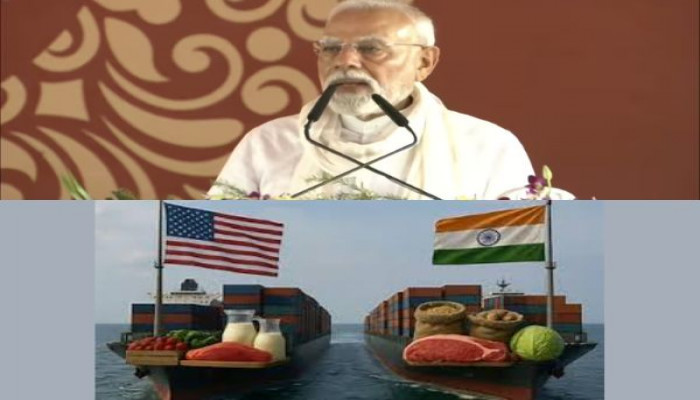PM Modi inaugurates projects worth Rs 2200 crore in Varanasi, slams opposition, saying ‘operation Sindoor success caused pain to some’
- In Reports
- 06:48 PM, Aug 02, 2025
- Myind Staff
Prime Minister Narendra Modi on Saturday launched a range of projects across important sectors such as infrastructure, education, healthcare, tourism, urban development, and cultural heritage. These projects were aimed at improving urban spaces, restoring cultural sites, strengthening connectivity, and raising the standard of living in Varanasi.
The Prime Minister reached Varanasi at around 11 AM and went on to lay the foundation stone and inaugurate several development works worth approximately Rs 2,200 crore.
Prime Minister Narendra Modi also delivered a strong message to the United States during an ongoing trade dispute, declaring that the well-being of farmers, small industries and youth remained the government's "top priority."
While addressing a gathering in Varanasi, he stated, "India is going to be the world's third largest economy... hence, India needs to keep an eye on its economic interests. Our farmers, our small industries, jobs for our youth... their well-being is our priority number one. The government is working hard in this direction."
Referring to rising uncertainty in global markets, he urged Indian companies to focus on domestic products. "I sincerely appeal to my business brothers and sisters of today that, when the world is experiencing such a climate of uncertainty, we should also sell only indigenous products. This determination will also be a real service to the country. We will now purchase only indigenous products every minute. This will be a great respect to Mahatma Gandhi," he said.
His comments came shortly after US President Donald Trump imposed a 25 per cent duty on Indian imports and threatened further action in response to India’s continued purchase of Russian oil and military equipment.
On his first visit to Varanasi since the April terror attack in Pahalgam, PM Modi also directly addressed Pakistan, warning that those who attacked India "will not even live in hell."
He said the success of Operation Sindoor had avenged the victims and also displayed India’s strength to the world. He dedicated the operation to "Mahadev" and to the Sindoor of the daughters who were killed in Pahalgam. "I fulfilled it with the blessings of Mahadev," he stated, referring to a promise he had made earlier.
"This is the first time I have visited Kashi since Operation Sindoor... I had promised to seek revenge for my daughters' Sindoor, and I did it through the blessings of Mahadev," Modi asserted. "Operation Sindoor revealed to the world India's ferocious form. Whoever attacks India will not be alive even in hell."
He strongly criticised the Congress and Samajwadi Party for, in his view, supporting Pakistan and questioning the army. "Congress has labelled Operation Sindoor as a 'tamasha'... Shall I pick up the phone and ask them first before initiating any action?" he said.
PM Modi reiterated his appeal to boost India’s economy through self-reliance. "I request my business brothers and sisters... we also sell only indigenous products. Every second, we will now buy only indigenous products. This will be a great tribute to Mahatma Gandhi."
During his visit, the Prime Minister also inaugurated and laid the foundation stone for 52 development projects worth over Rs 2,180 crore. He disbursed Rs 20,500 crore to farmers under the PM-Kisan scheme and launched new initiatives in healthcare, education, tourism, infrastructure and rural development.
Trade tensions between India and the US continued as President Trump’s comments came after a broader White House announcement of new trade measures impacting 70 countries, including India. "India will thus be paying 25 per cent tariff, plus a penalty for above," Trump stated, criticising India’s trade policies and its strong defence and energy ties with Russia.
"I don't care what India does with Russia. They can go down with their dead economies together, for all I care," he wrote in a Truth Social post.
In response, India’s Ministry of External Affairs defended the government’s position and said the country’s energy policy was based on national interest. MEA spokesperson Randhir Jaiswal stated, "We take decisions based on the price at which oil is available in the international market and depending on the global situation at that time."







Comments